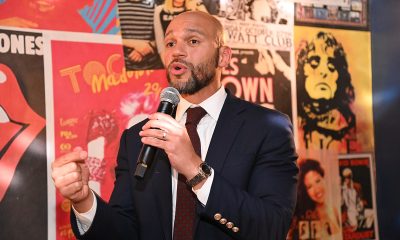Local
LGBT witnesses back D.C. anti-bullying bills
ACLU says legislation could violate students’ civil liberties

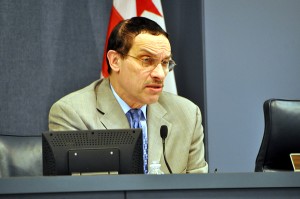
D.C. Mayor-elect Vincent Gray presided over a hearing this week on two bills to address bullying and harassment in public schools. (Washington Blade file photo by Michael Key)
Nine witnesses representing the LGBT community expressed strong support for two bills aimed at prohibiting bullying in D.C. schools, public libraries and parks during a City Council hearing this week.
The LGBT witnesses, including two gay and one transgender student, gave examples of anti-LGBT bullying and harassment in the D.C. public school system. They joined other witnesses in noting that existing public school policies pertaining to bullying were not strong enough to adequately address the problem.
“The District of Columbia has been a pioneer on issues such as nondiscrimination in schools and yet is one of only a handful of jurisdictions in this country without an anti-bullying law,” said Alison Gill, a public policy associate with the Gay, Lesbian & Straight Education Network (GLSEN).
Gill and other witnesses pointed to the 2009 D.C. Youth Risk Behavior Survey, a federally funded study that includes data on lesbian, gay, and bisexual youth. Among other things, the study found that 29 percent of LGB teens in the city’s middle schools and high schools have attempted suicide. The study did not collect data on transgender students.
Anti-gay bullying and harassment are believed to have played a large role in prompting the youth to consider suicide, Gill and other witnesses said.
D.C. Mayor-elect Vincent Gray presided over the hearing in his current role as City Council Chair and chair of the Council’s Committee of the Whole. He takes office as mayor on Jan. 2.
The Committee of the Whole and the Committee on Libraries, Parks and Recreation, which is chaired by Council member Harry Thomas (D-Ward 5), conducted a joint hearing on the two bills, the Bullying Prevention Act of 2010 and the Harassment and Intimidation Prevention Act of 2010.
Gray said after the hearing that the two bills would be combined following a markup hearing that he predicted would take place sometime next year.
“I don’t see the evidence of a comprehensive policy existing in the city on this,” Gray told reporters after the hearing, saying a combined version of the two bills would go a long way to address the problem of bullying.
The Bullying Prevention Act, which Gray and Council member Michael Brown (I-At-Large) introduced in April, calls for developing a “model policy prohibiting bullying, harassment and intimidation in the District of Columbia public schools.” It requires all public schools to adopt an anti-bullying and harassment policy at least as strong as the model policy defined in the bill.
The Harassment and Intimidation Prevention Act, which was introduced in October by Thomas, calls for developing similar policies banning bullying and harassment but expands the coverage to D.C. public charter schools, the city’s public libraries and parks and recreation centers, and to the University of the District of Columbia.
Thomas’s bill also covers bullying and harassment conducted through “electronic communication,” such as e-mail or social networking sites.
The bill defines harassment, intimidation or bullying as “any gesture or written, verbal or physical act, including electronic communication, that is reasonably perceived as being motivated either by any actual or perceived characteristic, such as race, color, religion, ancestry, national origin, gender, sexual orientation, gender identity and expression, or a mental, physical or sensory handicap, or by any other distinguishing characteristic…”
It says an act of bullying, intimidation or harassment would be one that “a reasonable person should know, under the circumstances, will have the effect of harming a student or damaging the student’s property, or placing a student in reasonable fear of harm to his person or damage to his property.”
The definition further states that the act in question “has the effect of insulting or demeaning any student or group of students in such as way as to cause substantial disruption in, or substantial interference with, the orderly operation of a school, university, recreation facility, or library.”
Arthur Spitzer, legal director of the D.C. chapter of the ACLU, said the ACLU supports the concept of anti-bullying legislation but has concerns that the wording of the two proposed bills in D.C. could violate students’ civil liberties.
“What does it mean by harming a student?” he said of part of the definition in one of the bills. “Does that mean hurting a student’s feelings? If a student comes in and says I feel very harmed by the fact that so and so said I was a crappy athlete … That’s not bullying,” he said.
“So I think the language here needs to be tightened up.”
Spitzer told the Washington Post that it would be “perfectly legitimate” for a student to say he or she thinks homosexual conduct is “against the word of God.” Although such a comment might hurt the feelings of a gay student, that should not be defined as bullying but instead as “an opinion that every student has a right to express,” he told the Post.
GLSEN spokesperson Daryl Presgraves said GLSEN believes the language in the two D.C. bills would not violate students’ civil liberties. But he said GLSEN and others supporting the bills would be open to making changes if the ACLU demonstrates that the language would prevent students from expressing their opinions in a way that doesn’t cross the line of true bullying and harassment.
Trina Cole, a male to female transgender student who graduated in 2009 from D.C.’s Dunbar Senior High School, told the hearing she was victimized by harassment and intimidation that went far beyond hurting her feelings.
“At school, I was often both verbally and physically abused,” she said. “We need to have more support in our schools so that the bullying that I went through does not continue to happen every day.”
Cole testified on behalf of Metro Teen AIDS, a D.C.-based group that provides services to LGBT youth at risk for HIV.
Ginnie Cooper, chief librarian for the city’s public library system; Jesus Auguirre, director of the Department of Parks and Recreation; and Mark Farley, vice president of the Office of Human Resources for the University of the District of Columbia each expressed strong support for the two bills.
A spokesperson for the D.C. public schools did not appear before the hearing. Gray said the person expected to testify had a scheduling conflict and was expected to submit written testimony within the next week.
Gay activist and ANC commissioner-elect Bob Summersgill noted that the D.C. Public Schools currently use city-adopted regulations pertaining to student discipline as a basis for addressing bullying and harassment of students. A provision of the city’s Human Rights Act and a March 2000 directive by the then D.C. schools superintendent are also used as a patchwork of rules or laws to address bullying.
“The limitations in all of these laws and regulations are the implementation and enforcement,” Summersgill told the hearing. “If a school fails to make clear that bullying will not be tolerated, or if a teacher or staff fails to intervene when bullying occurs, or if a teacher or staff makes a derogatory comment or through inaction shows their distaste for some group, then they are tacitly giving approval of bullying and harassment,” he said.
Michael Musante, an official with Friends of Choice in Urban Schools (FOCUS), which advocates for D.C.’s public charter schools, said the group did not support the proposed legislation, saying charter schools were formed as semi-autonomous institutions independent from city control.
He said many charter schools already have anti-bullying polices and said charter schools prefer to address bullying through school disciplinary codes rather than “one-size-fits-all legislation.”
Gray and Council member Michael Brown, speaking after the hearing, said they favor including charter schools in the legislation before the Council.
“They have over 30,000 of our kids being educated with public money,” Gray said of the charter schools.
Others who testified in favor of the bills at the hearing included Renee Reopell, program associate for the D.C. LGBT community center; Peter Rosenstein, LGBT community activist; Rick Rosendall, vice president of the Gay & Lesbian Activists Alliance; Bill Briggs, executive director of Metro D.C. Parents, Families and Friends of Lesbians and Gays (PFLAG); and Andrew Barnett, executive director of Sexual Minority Youth Assistance League (SMYAL).
District of Columbia
D.C.-area schools to protest Trump’s ‘assault on public education’
Students unite against Trump’s education cuts in unprecedented protest

Student government leaders from multiple D.C.-area schools are coming together to protest recent Trump administration actions aimed at restricting student rights in America.
On Friday, April 4, at 4 p.m., the student governments of Georgetown, George Washington, Howard, American, George Mason, and Temple plan to protest the Trump-Vance administration’s efforts to dismantle public education at the Department of Education building (400 Maryland Ave., S.W.), just south of the National Mall. This “unprecedented coalition” of higher education student governments in the D.C.-Maryland-Virginia region, representing 130,000 students, will gather to tell the administration to keep its “Hands Off Our Schools.”
In a statement emailed to the Washington Blade, Asher Maxwell, press coordinator for the Georgetown University Student Association, called this a “historic coalition” and said the protest will highlight how Trump’s policies—dismantling the Department of Education, eradicating DEI initiatives, eliminating funding for academic programs and financial aid, and silencing student voices—are affecting students.
Former middle school principal and U.S. Rep. Jamaal Bowman of New York, along with campus free speech advocate Mary Beth Tinker, known for her role in Tinker v. Des Moines, are slated to speak at the rally about the importance of public education and free speech amid what they call the administration’s disregard for the rule of law and constitutionally protected acts such as protesting and speaking out against the government.
The rally is expected to draw thousands of students, from college to kindergarten, as well as First Amendment supporters and those angered by the administration’s efforts to minimize the federal government. Since taking office, Trump has laid off tens of thousands of federal employees, including many within the Department of Education, as he and his senior adviser, Elon Musk, strip away protections and federal spending that disproportionately affect LGBTQ people, people of color, and students.
The Washington Blade reached out to the White House for comment but has not received a response.
District of Columbia
D.C. police investigating anti-gay assault in Shaw
Police say suspect punched victim in face after shouting ‘homophobic slurs’

D.C. police are investigating a March 7, 2025, assault case listed as a suspected hate crime in which an unidentified male suspect punched a man in the face on the sidewalk outside an apartment building after calling the victim and his male friend “faggots.”
The victim, Destin Karol, and his friend, Ian Dotson, both residents of Arlington, Va., told the Washington Blade the assault took place about 10 p.m. while they were walking along 7th Street, N.W. on their way to the Shaw-Howard University Metro station.
The two men said while walking in front of the upscale 7th Flats apartment building at 1825 7th St., N.W., they saw the male suspect and a woman he was with get out of a car parked in front of the building. Seconds later, they saw the woman vomiting on the sidewalk as they walked past her, the two men told the Blade.
At that time, the male suspect yelled, “What are you looking at, faggots,” Karol and Dotson told the Blade. The suspect then punched Karol in the face “several times,” according to a D.C. police report.
Karol said he was diagnosed the next day at a hospital in Arlington near his home with a broken jaw that required the jaw to be wired shut.
Dotson said D.C. police arrived on the scene after he called 911 after witnessing the suspect punching Karol, knocking him down and kicking Karol in the face while he was lying on the sidewalk.
Karol said an ambulance arrived on the scene and paramedics treated his facial injury with an ice pack and offered to take him to the hospital. He said he declined the offer, choosing to go home first. But upon experiencing intense pain the next day, he visited a medical clinic whose doctors told him to immediately go to the nearby hospital emergency room.
An initial version of the D.C. police incident report did not list the incident as a suspected hate crime. But a revised version of the report, which was issued after the Blade contacted police to ask about the earlier report, classifies the incident as a “suspected hate crime.”
The revised report states that the suspect, after telling the victim, “What are you looking at,” proceeded to “close fist strike Victim 1 in the left jaw area several times.” It says Subject 2, who was Dotson, told police the suspect “yelled out homophobic slurs.”
The report concludes by saying, Suspect 1 “was last seen heading inside 1825 7th Street, N.W.”
According to Karol, police so far have not changed the report, at Karol’s request, to list the incident as an ‘aggravated assault’ rather than its current listing as a “simple assault.” Karol points out that under police policy, an assault-related injury that causes a broken bone should be classified as an aggravated assault.
Karol and Dotson said the police report also does not mention that they told the two police officers who arrived on the scene that they saw the suspect and the woman he was with get out of a car and they showed the two officers which car it was as it was parked in front of the apartment building.
Karol told the Blade he and Dotson asked at least one of the officers to take down the license plate number of the car, but the officer said it was not necessary for him to do so. Dotson said he recalls that the car was a white, 4-door Volkswagen hatchback with a Virginia license plate.
Dotson said he and Karol were disappointed that the police did not appear to take down the license number and he regrets that he did not write it down himself. But he said he recalls that the Virginia license tag consisted of all letters and no numbers, with the letters “IN” as part of it.
He described the suspect as a white male appearing to be between 35 or 45 years old with brown hair and a goatee or beard.
D.C. police spokesperson Paris Lewbel said a Third District police detective has been assigned to the case and the case remains under active investigation. He said he could not comment on the issues raised by Karol and Dotson under a police policy of not disclosing specific details in an ongoing investigation.
Karol said he has been speaking with Detective Wilson, whose first name he does not recall, and said he most recently spoke with her on Tuesday, April 1. “They’re trying to get the license plate of this individual and they’re trying to get the camera footage from the apartment building and the adjacent buildings,” Karol said the detective told him.
Dotson said at the time the police arrived on the scene on the night of March 7, an employee from the 7th Flat apartment building who identified himself as the concierge came out of the building and told one of the police officers that he saw the male suspect and the woman he was with enter the building.
Police spokesperson Lewbel said he could not disclose whether the concierge was able to help police identify the suspect under the policy of not disclosing details of an ongoing investigation.
Police urge members of the public who may have witnessed an incident like this or who may know something about it, including the identity of a suspect, to call the police information line of 202-727-9099.
District of Columbia
Hundreds in D.C. rally for ‘trans dignity and justice’
‘We bow down to your charisma, uniqueness, nerve and talent’

Before any visible signs of political protest or activism appeared in “America’s Front Yard,” the sounds of cheers, applause, and the faint melody of Madonna’s Vogue echoed through the air, audible from blocks away. As the Capitol came into view and the crowd neared 3rd Street, small groups of people adorned in bright pink, blue, and white gathered along the pebble-covered pathways and the soft, lush grass of the National Mall. The sun peeked in and out of the clouds as the Transgender Day of Visibility Rally began.
Since its official designation in 2009, March 31 has marked International Trans Day of Visibility. This year, with one of the most anti-trans administrations ever holding power in the White House (and in Congress), the urgency of visibility has never been more keenly felt. For those gathered, holding signs and standing in solidarity, this moment was a call to make trans people seen and heard.
The rally, organized by the Christopher Street Project, a trans advocacy group and PAC, brought together nearly 20 Democratic lawmakers on the National Mall to speak out against the Trump-Vance administration’s efforts to erase the trans community.
Tyler Hack, executive director of the Christopher Street Project and one of the driving forces behind the event, took the stage first. The tall, curly haired redhead was perfectly framed against the dome of the Capitol and the increasingly darkening sky — a fitting backdrop to the growing frustration with the lawmakers inside.
As the crowd settled, Hack took a deep breath and began.
“Thank you to the hundreds of people who showed up,” Hack said. “We have buses on their way, we have people who are coming after work, and we’ll make room for those folks as they keep joining us. And thank you to all of you for showing up to celebrate, to make your voices heard and to fight together for trans dignity and justice.”

Hack founded the Christopher Street Project in January as a direct response to President Donald Trump and the far-right’s growing influence — and their attempts to erase the transgender community. As Hack spoke, it became clear that the fight for trans rights was, at its core, a fight for survival.
“We at Christopher Street Project believe that being a Democrat means more than just your party affiliation,” Hack said. “It’s about unapologetic defense of trans people wherever they’re being attacked, and in the face of this massive threat to all of our rights, in the face of what Trump and his billionaire cronies are unleashing. We demand more from the people we elected to protect us. We deserve more, and we say with all of the power that we have, powers have no place in Congress.”
Hack continued, “Our guiding principle is courage; 56 years ago, that courage was demonstrated by the queer and trans people who led the Stonewall riots. My great uncle, Mark Scheer, was one of them. Beaten up in the Stonewall Riots for standing up for people like himself and standing side by side with his trans siblings. It was his courage and the courage of Marsha P. Johnson and Sylvia Rivera that ensured we would never be erased.”
The crowd, now slowly filling the grassy lawn, erupted in cheers and clapping as Hack introduced the next speaker. Behind them, members of Congress began to exit their cars, re-reading their speeches for a final time while Christopher Street Project volunteers worked to keep the rally moving.
Rabbi Abby Stein, a trans activist and author, took the stage next. Her passionate speech felt like a sermon and a call to action against the transphobic forces in power.
“It is our moral obligation to make sure that we are visible, so that all the people who came before us and the people coming after us will know that who they are is beautiful, that being trans isn’t just OK,” Rabbi Stein said. “It is something that is worthy to celebrate, and it is something that no one in the world can ever take away from you, regardless of how much military or police or physical abuse they try to use on us. A world without trans people never existed and never will, no matter how much they try. We have defeated fascist titans before and we will defeat them again.”
Several speakers at the rally also highlighted the current administration’s disturbing parallels to fascist leaders of history. Democratic Whip Katherine Clark was one of those who called out transphobia and provided the crowd with insight into the Republicans’ strategy.

“Republicans are trying to divide us and distract us so they can funnel more money and more power to a select few,” said Clark, the House Minority Whip (D-Mass). “We’ve been in these moments before, we know the playbook, whether it’s the ’30s in Berlin or the ’60s in New York or right now in Washington, D.C. They distract and divide and scapegoat so they can tear everybody down. This time they’re using this community, our trans community. They want Americans to believe that our LGBTQ neighbors are to blame for the challenges we face as a country. They hope that if we’re focused on all of us, we won’t notice that the Republicans are closing our public schools that they’re defunding Social Security, slashing our health care, firing veterans, increasing costs of housing and groceries and starting trade wars with our allies. And what is the point? What is the point of this reckless agenda to enrich the billionaire class? And it’s all part of one corrupt plot in MAGA America. The 1% have access to wealth, freedom, power and voting rights, but not for the rest of us.”
Other members of Congress addressed Trump’s escalating attacks on the trans community.
“The reason they’re attacking all of these things is because they know what every authoritarian knows: Organized people, organized workers, marginalized people with autonomy and without fear, that’s a threat to their power,” Rep. Summer Lee (D-Pa.) explained. “That’s why they’re coming for our books, our doctors, our teachers, our workers, and especially our trans youth. But they’re not just a talking point.”
“I want to say what’s happening right now, especially to our trans siblings, is cruel,” Lee continued. “It’s bullshit. It is not normal, and we will stand up against it. But this is not just a policy disagreement, it’s not a debate. It’s by design. It’s targeting. And they are purposely going after some of the most marginalized people in our society.”
Lee went on to address the chilling effects of Trump’s anti-trans executive orders on transgender Americans’ lives, particularly in places like Pittsburgh.
“This is what Trump’s anti-trans agenda looks like,” Lee added. “Even without a national ban, the fear, the pressure and the silence they create is doing the work for them. It’s making health care providers hesitate. It’s making institutions retreat. It’s making families feel isolated or abandoned or unsafe, and I just want to say it here, when you make it harder for children to be seen, to be loved, to be treated with dignity. That’s not just a policy failure. That is a moral failure.”
Rep. Robin Kelly (D-Ill.) bluntly stated that Trump’s policies will lead to the deaths of LGBTQ people both in the U.S. and abroad, citing the severe consequences of his cuts to foreign aid programs like PEPFAR, the President’s Emergency Plan for AIDS Relief.
“His actions and those of Republicans who bend the knee have severe consequences,” Kelly said. “It threw global healthcare programs into chaos, especially PEPFAR. For over 20 years, PEPFAR saved over 26 million lives worldwide, and has been a lifeblood and a lifeline for LGBTQ plus people in the face of stigma and discrimination in many countries, especially in places where being true to yourself comes with immense risk. PEPFAR is the only program that provides HIV prevention, treatment, and care.”
“We are just five years away from ending the HIV/AIDS pandemic,” she added. “Our progress cannot stop.”
The rally ended with an unexpected but powerful appearance by actress, director, and producer Lena Dunham, who spoke about her experiences living with her trans sibling, Cyrus Dunham.
“When I asked my sibling what he might want to hear me say today and what he did not want me to say, which included phrases like ‘boots the house down, mama,’ he made it clear that there would be enough dialogue about what impossible odds are faced right now for the trans community, especially trans youth and trans people of color, and enough conversation about the horrific abuses that the government is attempting to commit and the rights they’re attempting to take away and already in the process of doing,” Dunham shared. “He said, my only job is to express how special, sweet, fab, fun, delightful and divine it is to be embraced by trans people, to live in proximity to trans lives, and to call this community our community.”
“We love you, we see you. We bow down to your charisma, uniqueness, nerve and talent, and we are so lucky to love you and to fight with you and for you, to learn from you and to ensure that our rights are inseparable from yours,” the “Girls” star added. “Trans lives don’t just matter. They transform the world into a place of possibility, joy, and discovery.”
As the sun began to set and the rally wound down, Hack reflected on the significance of the event.
“Being resilient in this moment is about continuing to be yourself and continuing to exist, because being a trans person in this moment is, in and of itself, resistance,” they said. “Making sure that folks have the support that they need, being a good ally to those people is resistance and making sure that trans people in your life know that they have your support is critically important, and is the number one way that we can resist these attacks.”
For more information on the Christopher Street Project, visit christopherstreetproject.org.
-
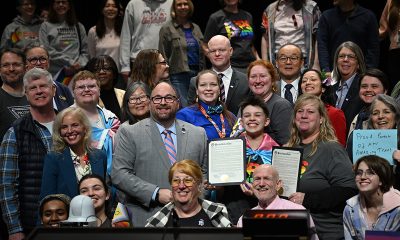
 Virginia4 days ago
Virginia4 days agoFairfax County School Board issues Trans Day of Visibility proclamation
-

 Trinidad and Tobago4 days ago
Trinidad and Tobago4 days agoTrinidad and Tobago recriminalizes homosexuality
-
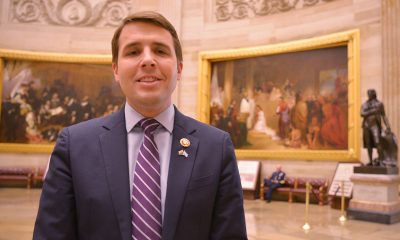
 Congress4 days ago
Congress4 days agoChris Pappas reportedly planning run for US Senate
-
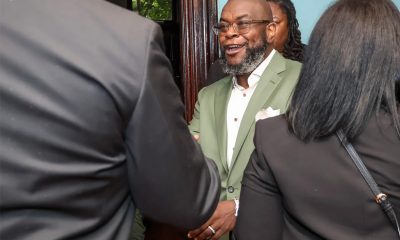
 National1 day ago
National1 day agoDestination Tomorrow works to empower LGBTQ community



